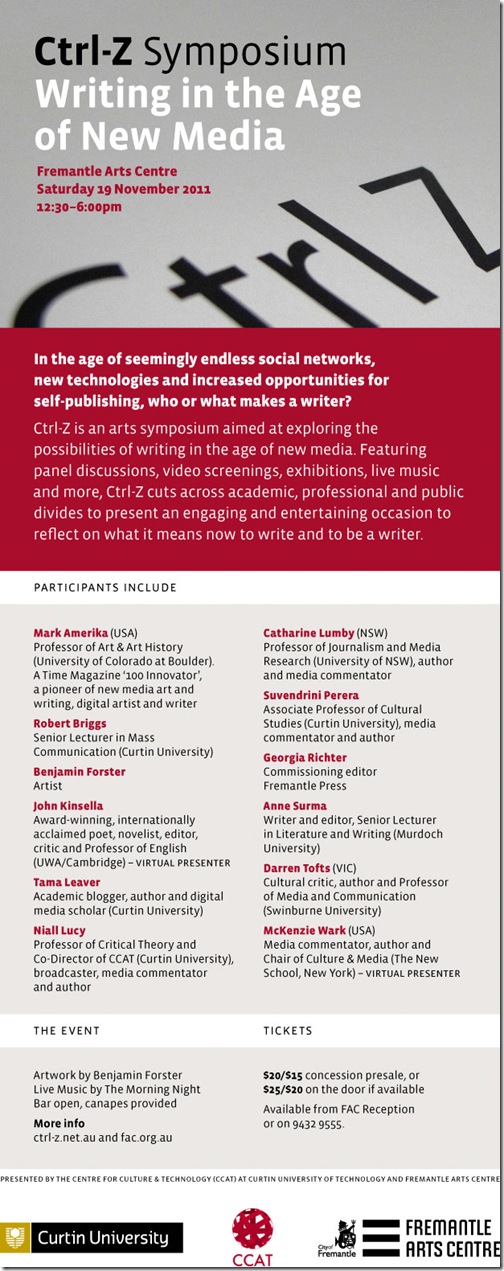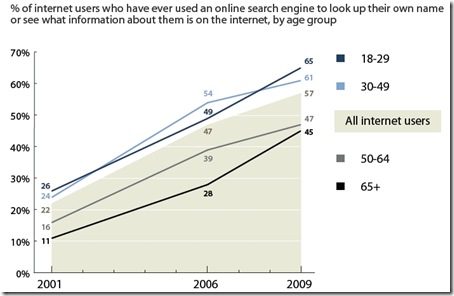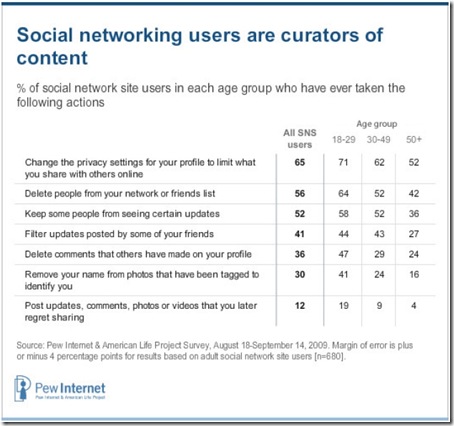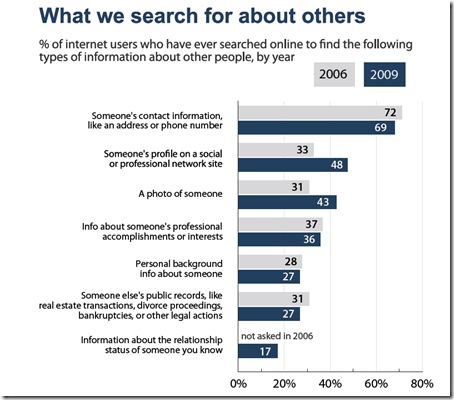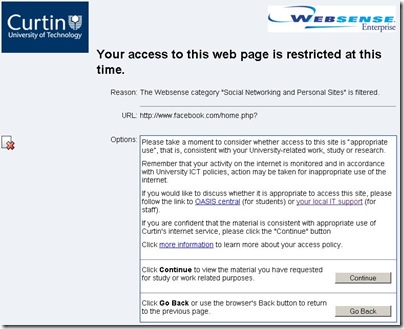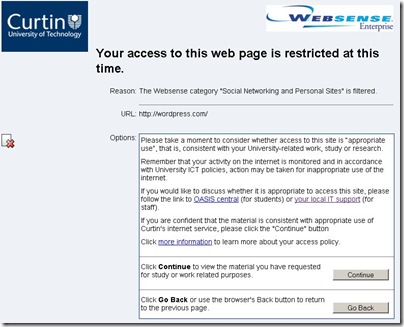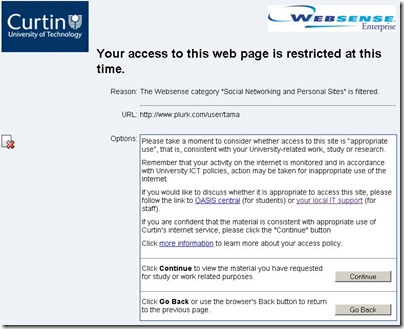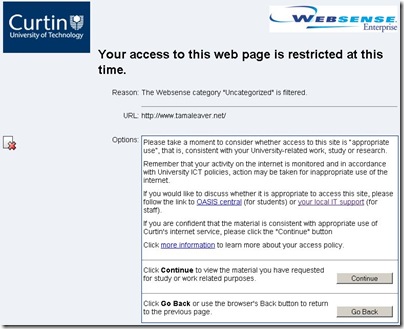Home » Curtin (Page 2)
Category Archives: Curtin
Ctrl-Z Symposium: Writing in the Age of New Media
This Saturday I’ll be participating in the Ctrl-Z Symposium at Fremantle Arts Centre. It’s broadly exploring ideas of ‘writing’ with a focus on new media (being very conscious of the provocative nature of that term, especially its newness!). The symposium is the first big event arranged under the umbrella of Curtin’s new Centre for Culture and Technology, and the title is shared by the upcoming Ctrl-Z journal which will launch next year. You can find the programme here and a spiffy flyer below. If you’re in Perth and free, it’d be great if you can join the discussions this weekend. The event kicks off at 1pm.
The Ends of Online Identity – Presentation
Here are the slides and audio for my ‘The Ends of Online Identity’ paper (abstract) I’m presenting in a couple of hours here at Internet Research 12 in Seattle:
I’ll try and record the talk and if it’s decent quality, I’ll synchronise the audio and slides as soon as I get a chance. Update: the audio turned out okay, so it’s now synchronised with the slides. If you’re interested, have a listen. I’d love to hear your thoughts and responses!
Digital Culture Links: September 21st 2011
Links for September 7th 2011 through September 21st 2011:
- Game over for Japanese teens as grey gamblers take prime slot at arcades [News.com.au] – “The country which gave the world classic arcade games such as “Space Invaders” and “PacMan” is facing a demographic crisis, with a dwindling birth rate and ever-swelling numbers of elderly people. So Japan’s amusement arcades, once an exclusive resort of youth, are increasingly becoming the abode of the old, The (London) Times said today. According to the Hello Taito game centre in the Tokyo suburb of Kameari, as many as 90 per cent of its weekday visitors are over 60 years old. In an effort to encourage elderly customers, the company is making concerted efforts to appeal to this unfamiliar demographic. Metal stools have been replaced by benches covered with old-fashioned tatami mats. Seaweed tea, popular among retired people, is provided free, as well as blankets and reading glasses. Even the deafening noises emitted by the arcade machines have been turned down to a minimum out of consideration for geriatric sensibilities.”
- Ctrl-Z new media philosophy – New broadly-themed and inclusive academic journal looking for submissions under the broad umbrella of “New Media Philosophy”.
- Harried, underpaid staff plan to flee the sector [The Australian] – *sigh* “Two in five academics under the age of 30 plan to leave Australian higher education within the next five to 10 years because of high levels of dissatisfaction caused by lack of job security, poor pay and mountains of paperwork and red tape. And for those aged between 30 and 40, the figure is one in three. Dissatisfaction and insecurity are so rife among casual and sessional staff that a new report for the Department of Education, Employment and Workplace Relations estimates that close to half the academic workforce will retire, move to an overseas university or leave higher education altogether within the next decade.”
- Online gamers crack AIDS enzyme puzzle [The Age] – Collaborative online gamers manage to crack a crucial enzyme which is key to combating HIV. This is tangible evidence of collective intelligence of game players when usefully directed and harnessed.
- danah boyd | apophenia » Guilt Through Algorithmic Association – How algorithms can make someone look guilty or attached to something, even if it’s only other searchers making that connection: “You’re a 16-year-old Muslim kid in America. Say your name is Mohammad Abdullah. Your schoolmates are convinced that you’re a terrorist. They keep typing in Google queries likes “is Mohammad Abdullah a terrorist?” and “Mohammad Abdullah al Qaeda.” Google’s search engine learns. All of a sudden, auto-complete starts suggesting terms like “Al Qaeda” as the next term in relation to your name. You know that colleges are looking up your name and you’re afraid of the impression that they might get based on that auto-complete. You are already getting hostile comments in your hometown, a decidedly anti-Muslim environment. You know that you have nothing to do with Al Qaeda, but Google gives the impression that you do. And people are drawing that conclusion. You write to Google but nothing comes of it. What do you do? This is guilt through algorithmic association.”
- Marilyn Monroe, Grace Kelly and Marlene Dietrich join Charlize Theron in new Dior J’Adore advert [Mail Online] – Marilyn Monroe, Grace Kelly and Marlene Dietrich all posthumously join Charlize Theron in a new perfume advertisement thanks to the plasticity of computer generated imagery.
Creepy: Educational Tool or Privacy Nightmare?
Like Please Rob Me and I Can Stalk U before it, Creepy is an application which lives up to its name. It’s a recently-released basic desktop application (Windows or Linux) which scrapes Twitter and a bunch of image sharing services, including Flickr, TwitPic and yFrog, and builds a diary and map of someone’s movements and the times these were logged. Now, Creepy only accesses data which is public, data which is shared online but, like Please Rob Me or I Can Stalk U, it presents this data is a way which isn’t conventionally available. More to the point, when confronted with a map of your day-to-day activity, plotted on the basis of social media activity, it can be quite confronting. The tool is described thus on the website:
creepy is an application that allows you to gather geolocation related information about users from social networking platforms and image hosting services. The information is presented in a map inside the application where all the retrieved data is shown accompanied with relevant information (i.e. what was posted from that specific location) to provide context to the presentation.
Additionally, the FAQ adds this detail and rationale:
1) Dude, this app is disturbing , what were you thinking ?
Well, I don’t think that the fact that your geolocation information can be gathered and aggregated is disturbing. The fact that you were publishing it in the first place , is , on the other hand. Just to be clear, the intention behind creating creepy was not to help stalkers or promote/endorse stalking. It was to show exactly how easy it is to aggregate geolocation information and make you think twice next time you opt-in for geolocation features in twitter, or hitting “allow” in the “this application wants to use your current location” dialog on your iphone.
So Creepy does explicitly claim to be an educational tool in the ‘here, look what you’ve already done, now change your habits’ kind of way. Running Creepy just based on my own Twitter information produced a rudimentary map of my logged activity in Perth (clearly Creepy is following data from FourSquare and Flickr images which I posted with my Twitter account):
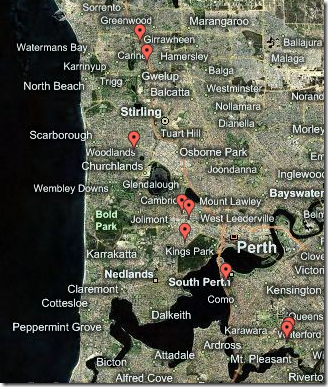
However, when I zoom in a long way, for example onto my workplace, there’s certainly a quite explicit level of geographic information:
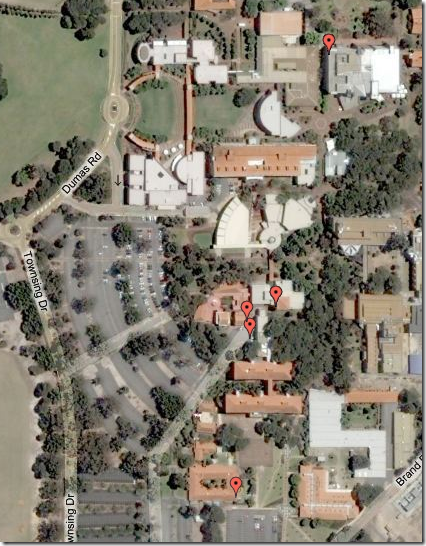
Now, I’m well aware of the data trail my Twitter, FourSquare and Flickr photos generate and acknowledge that if someone wanted to they could aggregate that information and build a reasonable picture of my activity. The point, though, is that many people aren’t that aware of the data trails they are leaving and that’s what Creepy purports to fix: it’s a very visible, confronting and explicit visualized map of the data trail you’re leaving. It’s not a technical privacy violation, but it might feel like an invasion of sorts. If it does feel that way, perhaps it’s time to think a little more about how, when and where you share information about yourself on social media and what data is actually embedded in your photos.
Reputation Management and Social Media
Today the Pew Research Centre’s Internet and American Life Project released their report Reputation Management and Social Media (2010) which is based on research undertaken late 2009. There is a great deal of important and topical information in the survey, with the US results likely to be slightly higher but certainly comparable to trends in Australia. I want to really draw attention to the way that younger adults are using social media according to this report, using three of Pew’s graphs to talk about their findings.
The first graph indicates how many internet users search for their own name online:
This result is particularly interesting for two reasons: firstly, it shows that across the board, interest in our own web presences has increased dramatically across the last decade; and secondly, it highlights that younger adults (those 18-29) appear to be the most concerned with their online reputation. As danah boyd celebrated earlier today, this result really undermines the cultural myth that younger people are the least interested with online privacy. Obviously this survey excludes people under-18, but it’s fair to assume that part of the process of growing up these days includes becoming sensitised to the importance of being aware of our web presence.
Similarly, the Pew report also highlights the face that younger people are the most active in controlling their presence online, insomuch as they are most likely to have changed their privacy settings on social networks, they are the most likely to untag a photo of themselves, and so forth:
Here we see that younger people are also the most conscious of shaping their web presence, by editing who can see what they share online, and which elements of the digital artefacts linked to them remain visible, and remain linked to their names.
The last Pew graph shows how much information people are seeking about others online:
Everything from contact details to photos are being sought online, which similarly highlights how important it is that everyone be aware of what their web presence really ‘says’ about them.
Since I teach in the Internet Studies department here at Curtin, it’s hardly a surprise that all of this information is vital to consider when we design the learning experiences our students encounter. In the first-year unit Web Communications 101, the notion of web presence is our central organising theme. However, one of the distinctions we make, which Pew does not, is the difference between digital traces we leave purposefully, and maintain control over, versus those we don’t. In Web Comms 101, as Pew does, we talk about footprints, but we also talk about digital shadows, those bits of digital media that are somehow attached to our names, or chosen identities, which we have minimal, if any, control over. Given how much people search for each other, and how much thought is going into how we appear online for the average internet user, it’s probably how we address and deal with those shadows which will be one of the most important topics to seriously consider in the coming years.
Developing a Web Presence During Candidature
I gave a short seminar today on the topic of developing a web presence during candidature. Honours, masters and doctoral students increasingly need to be aware of the tools and conventions that most directly allow them to be part of their scholarly field online. Hopefully this presentation gave some students here at Curtin some beginning ideas. I fear the slides are somewhat less useful without the presenter, but on the off chance they’re useful to anyone, here you go:
As always, comments are most welcome.
Learning, Authenticity & Online Policy Primers
This year I’ve been enjoying designing and implementing a series of new assignments and assessment techniques with students in our Internet Studies programmes. One of the most challenging things about working in Internet Studies is trying to make assignments authentic – which basically means doing assignments which can end up being meaningful and, ideally, viewable by the world-at-large on the Internet. One assignment that has worked particularly well and I thought worth sharing is from the unit Online Politics and Power, which looks at power in various guises and instances online.
One of the most interesting ways power is deployed online is through those infamous Terms of Use and Terms of Service which 95% of people never read, but always agree to, when signing up for a new service. So, I thought it’d be useful to ask students to really interrogate the Terms of Service of some online tools and platforms. More to the point, I wanted this to be a useful assignment beyond the confines of a university unit. So, I asked students to find a way to communicate the core elements of some Terms of Use in a way that would be accessible to the general public, hence an Online Policy Primer. (If you’re interested the assignment outline and requirements are online here.)
I have to say, I was blown away by how good the Primers are, and how, ultimately, useful they are, too. Also, while we did discuss the Creative Commons, I didn’t stipulate that students had to use a CC license, but I was delighted that many chose to do so. Of those that did, I’d like to share three stand-out examples.
The first, by Paula (@MXYZ_), takes a close look at Flickr’s Terms of Service and is licensed under a Creative Commons Attributions Share-Alike license [CC BY SA]:
The second, by Simon (@whoisimon) explores the Terms of Service for Slideshare and is licensed under a Creative Commons Attribution, Non-Commercial, Share-Alike license [CC BY NC SA]:
And the third, and final, policy primer I wanted to highlight is by Chea Hwey Yea, looking at Twitter’s Terms of Service and is also licensed under a Creative Commons Attribution, Non-Commercial, Share-Alike license [CC BY NC SA]:
These are just three examples of the many, many wonderful primers students created; while not everyone used a Creative Commons license, three more Primer’s worth highlighting are a machinima presentation exploring Second Life’s Terms of Service created by Rhys Moult, Renee Bird’s close look at the Terms of Use for the Multiplayer Online Game Evony, and Veronica Fry’s analysis of YouTube’s Terms of Service.
As you can see, these students have a lot to be proud of and have, in many cases, created Primers which are likely to be useful well beyond the confines of the unit!
Privacy, Power, Permanence & Politics!
One of the reasons I’ve been so quiet is that in the past few weeks I’ve started teaching two new units here at Curtin. Both of these units have been completely redeveloped and this is their first run in the new form. I’ll talk about Web Communications 101 another day, but I wanted to point out how much I’m enjoying teaching our new Internet Politics and Power unit. The unit has a healthy dose of thinking from people like Lessig and Zittrain and really tackles many of the big issues for digital culture today. So I’m now required to stay on top of many of those issues I like to blog about, like privacy and copyright, rather than having to steal a hour here or there! 🙂 There are so many issues that are relevant today, but one area which is really getting me thinking is the way that Apple, Google, Facebook and others are creating their own bounded realms of control!
A recent example that really highlights the complexity of these issues is the policing of Apple’s application store for the iPhone. Recently there was a a fairly heated discussion after Apple rejected the Ninjawords: iPhone Dictionary application ostensibly for offensive words (but words which are present in many other apps). It turns out Apple had more complex reasoning which was, among other things, wrapped up with new parental controls being introduced for apps. While this rationale is less bizzare, John Gruber still makes the very important point that the biggest issue is there needs to be "fairness, consistency, and common sense in the App Store review process" and that consistency is, thus far, sorely lacking.
Apple’s app store has also been under fire for rejecting a Google app which would allow many users to access cheaper calls and services. Elisabeth Oppenheimer, writing at Zittrain’s Future of the Internet blog, notes that Apple claimed that they rejected Google’s app since it "duplicates iPhone functionality" but in real terms many people suspect it was rejected since it threatened the monopoly AT&T have enjoyed in being the exclusive iPhone service provider in the US. Oppenheimer is "hopeful that killing Google Voice will be the one step too far that inspires consumers and regulators to sit up and work to get sensible open-access rules" but I’m not necessarily that optimistic.
Meanwhile, Rupert Murdoch is demanding Amazon hand over the details of Kindle users who subscribe to media from Murdoch’s vast empire. So far Amazon has not complied, but I wonder if they’re willing to risk their relationship with Newscorp in the long run? Along similar lines, this week Facebook purchased Friendfeed which potentially adds even more information to Facebook’s vast array of user information that they manage in, at times, curiously questionable ways.
While not quite an app, on another front the permanence of archives has come under threat from another third-party tool. While there have been concerns for a while about URL-shortening services, the upcoming closure of tr.im is the first one that I know of to go under. These services have become extremely popular, allowing people to create tiny web page addresses that can fit alongside a tweet and still fit Twitter’s 140 character limit. However, what will happen to all of the tweets which contain tr.im address? They’ll go dead, effectively making those tweets useless. While tr.im is not really to blame (really, what is the business model for a URL-shortener?), our reliance on these services leaves our tweets and related links fragile and vulnerable when a company or service collapses under the weight of their own popularity. This is less a privacy issue than an issue of utility: relying on third-party tools with no real backup function leaves the usefulness of our personal and collective archives in the hands of folks who, ultimately, may not have the resources to run these services forever!
Update: On the tr.im font there appears to be a happy ending, with the announcement that tr.im is becoming a community-developed open source project.
Update 2: Apple claim that they “did not reject an iPhone application submitted by Google and that it was still studying it, in part because of privacy concerns.”
Curtin’s Internet Filtering and Blocking
How much does your educational institution filter the internet, especially if you’re at tertiary level (because K-12 filtering has other issues attached to it)? I ask because in my recent shift to Curtin, I’ve discovered the joys of university-level internet filter, something that didn’t happen at my previous institution. The list of blocked or click-thru site (ie not completely blocked, but having a warning message asking if you really need this website) seems to alter week to week. This morning, every time I want to visit Twitter, Plurk, Facebook or even a wordpress.com blog, I have to click through a warning page; every time I reload, I have to click through a warning page. Apart from being highly frustrating, I’m currently redesigning several units which are thematically linked by the concept of web presence; almost everything I want students to look at will have these warnings on the Curtin network. I wonder how many students will get frustrated and give up on the unit? This morning’s blocks so far …
Ironic Update: The first attempt to upload this blog post from my work computer led me to discover that even this website is blocked now:
I wonder what sort of hoops I’m going to have to jump through to try and fix this? 🙁
Update 2: Most of the blocking seems to have magically stopped as suddenly as it began about 12 hours ago so, being generous, I’d like to believe this was an accidental blocking … I’d really like to believe that …
A New Position & New Beginnings …
 So, I’m a bit behind on announcing my new position, but for those who don’t already know, I’ve accepted a lectureship in the Internet Studies department at Curtin University of Technology. The move was motivated by a couple of things, but one the main factors, to be honest, was job security; with an almost-four-month old at home, escaping from rolling one-year contracts suddenly seemed very important! That said, Internet Studies has a lot to offer: I’m working with some fantastic colleagues, am teaching in areas closer to my own research interests than ever before, and this year Curtin is in the midst of reworking its curriculum for a new course structure in 2010 which means I’ll get lots of opportunities to redesign existing offerings and plan out a new stream around the notion of digital presence! I’m pleased that my broader interests in digital culture, as are often evident in this blog, will be at the fore of my teaching now rather than a just a fragment as has been the case in past years.
So, I’m a bit behind on announcing my new position, but for those who don’t already know, I’ve accepted a lectureship in the Internet Studies department at Curtin University of Technology. The move was motivated by a couple of things, but one the main factors, to be honest, was job security; with an almost-four-month old at home, escaping from rolling one-year contracts suddenly seemed very important! That said, Internet Studies has a lot to offer: I’m working with some fantastic colleagues, am teaching in areas closer to my own research interests than ever before, and this year Curtin is in the midst of reworking its curriculum for a new course structure in 2010 which means I’ll get lots of opportunities to redesign existing offerings and plan out a new stream around the notion of digital presence! I’m pleased that my broader interests in digital culture, as are often evident in this blog, will be at the fore of my teaching now rather than a just a fragment as has been the case in past years.
Leaving UWA has been an odd experience, almost like leaving home, in a way. I started out there as a very unsure undergraduate in 1995 majoring in History; along the way my interest shifted to popular culture and media studies and, after a fairly abrupt track change, I ended up with my BA(Hons) in English, Communication and Cultural Studies. Not content with five years tertiary study, I continued straight into a doctoral programme which eventually led to a PhD looking at what I termed Artificial Culture. Along the way I tutored, guest lectured and had the privilege of writing and running several units in English and Cultural Studies, Women’s Studies and the newly independent Communication Studies. In 2006, with PhD in hand, I accepted a position at UWA as a Higher Education developer in 2006 and 2007 and while I enjoyed teaching postgraduates and new academic staff about tertiary teaching, I was definitely happiest last year when I returned to Communication Studies and had the pleasure of teaching an outstanding cohort of undergraduates from first-years to honours students. From the Student News Projects and Digital Media Projects in Comm2203, to the Remix Video Projects by the students in my iGeneration honours unit, I was consistently impressed by what tomorrow’s media creators were achieving as students today! My colleagues in Communication Studies were all fantastic, too, and I’m looking forward to knowing them primarily as friends in the coming years.
This coming semester I’m looking forward getting to know my new colleagues in Internet Studies better, and to being impressed by my Curtin students. It’ll be a different style of teaching, as Internet Studies offers on-campus, external and Open University versions of most units, so there will be a lot more online teaching which will hold new challenges, but no doubt new exciting opportunities, too. In the coming months I’m teaching one unit on Virtual Communities and another called Network Culture and the Virtual Society, so I should be right at home there. Learning a new university, new systems, new rules and new procedures will take a while, especially when the UWA systems really are like second nature to me by now, but it’s a new beginning for me and I’m looking forward to making the most of Internet Studies both in teaching terms and to kick-start a few of the more web-based research projects I’ve been planning. More details on those as they start to reach a more robust form …
(Oh, and the reason blogging has slowed isn’t just due to the move to a new university; my home computer has been running slower and slower under Windows Vista for the past few months until it became unmanageable about a week ago … I’m now in the process of transferring to a new OS, but it’s a gradual process so I’m using an older laptop at home which, being generous, is good for email and word processing at most. Blogging shall resume in full in the coming weeks!)
